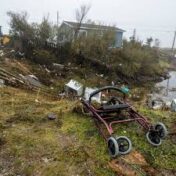Author Archives: Shannon Jones
A new podcast from Statistics Canada on Disability

On November 25th, 2021, Statistics Canada launched a new podcast series affectionately called Eh-Sayers, presumably referring to one of Canadians’ most endearing sayings! This episode is called Talk about the barriers, not the disability: Activity limitations and COVID-19. It features national data on the realities, challenges and changes that the pandemic has brought to the daily lives of people living with… Read more »
A “business case” for hiring disabled people

There is clear evidence of the reluctance of some employers to hire people with disabilities. Our colleague, Catherine Connelly from McMaster, in collaboration with Sandra Fisher of Muenster University in Germany, conducted a study of one large employer in the hospitality industry to advance a business case for hiring people with disabilities. Using utility analysis, they showed that service costs… Read more »
Access to powerchair sports
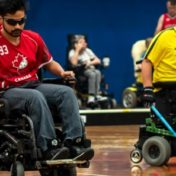
Media coverage of the recent Paralympics in Tokyo drew popular attention to parasports, but significantly under-represented sports where athletes use powered mobility, such as boccia, powerchair soccer, and powerchair hockey. These sports make participation accessible for those who use power wheelchairs to compete. They do however challenge us to re-imagine elite athletic performance. Our partners Amy Latimer and Jordan Herbison… Read more »
Discrepancy awareness training to change attitudes towards disability
This project is a collaborative evaluation of a novel approach to changing attitudes toward disability. The approach, called Discrepancy Awareness, uses creative media to bring individuals into contact with their implicit attitudes. In collaboration with PlaysThatWork, the project uses dramatic scenarios to uncover and confront implicit attitudes, and to allow participants to gain insight and reconcile discrepancies with their expressed… Read more »
Building an evidence-based Universal Design framework for employment standards

This national collaboration, led by the CNIB, undertakes an evidence-based approach to the development of employment standards and educational resources on the application of universal design and principles of inclusion within the workplace setting with a focus on sensory and visual processing disabilities.
Using scenario planning to address ambiguous risks: The future of tourism for persons with disabilities
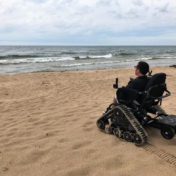
In this research project, we use scenario planning to examine the extent to which disabled peoples’ issues are part of the consideration for resumption of travel. Ambiguous risks are those for which there are legitimate, competing and irreconcilable knowledge claims. Ambiguous risks currently manifest in discussions about tourism and persons with disabilities as a result of COVID-19.
Time use and well-being during the COVID-19 crisis
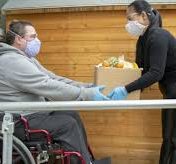
This project seeks to understand the decisions people are making every day about how to structure their day, use their time, look after themselves and those they love, and how to act in the best interests of the population. Crises such as the COVID-19 pandemic exert a double jeopardy on vulnerable populations, often having multiplicative rather than simply additive effects. … Read more »
Towards barrier-free communities: A partnership for improving mobility, access and participation (MAP) among people with disabilities
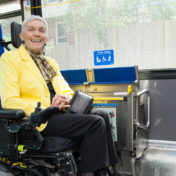
This Partnership identifies environmental mobility and social participation barriers and facilitators in Canada that are experienced by mobility device users. A community-engaged research approach collaboratively identifies and prioritizes research and development of barrier-alleviating interventions including guidelines, training, and policies. In this Partnership, we address these priorities by involving all partners in developing research questions, goals, and methods designed to improve… Read more »
A narrative inquiry into teachers’ perception of disability
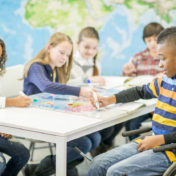
This project uses narrative inquiry to uncover hidden attitudes and beliefs regarding disability. Narrative inquiry has been used to understand lived experiences, due to its ability to its ability to elicit implicit attitudes as compared to traditional forms of questionnaires and surveys. This pilot includes the development and launch of a web-based learning module for teachers and teacher candidates, as… Read more »

